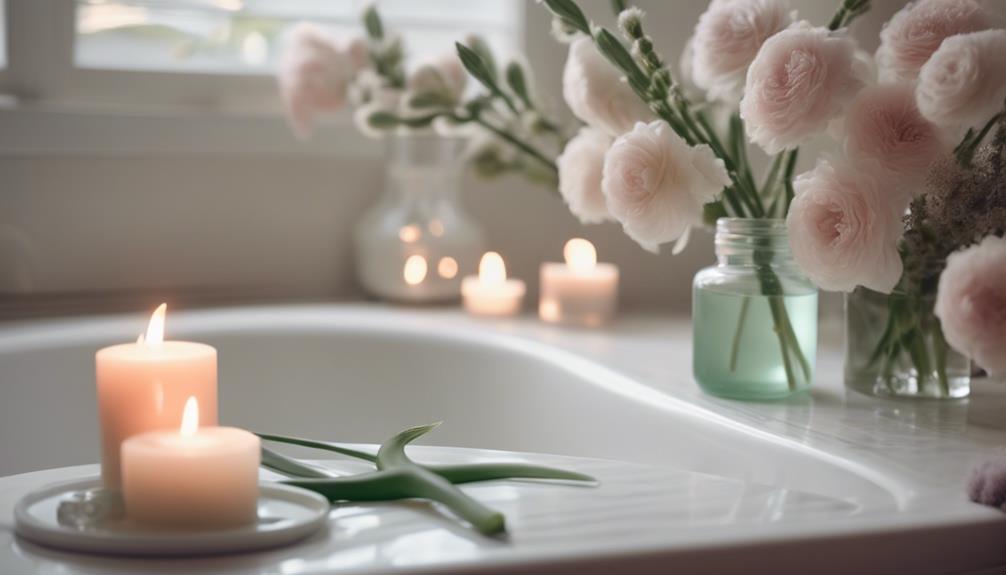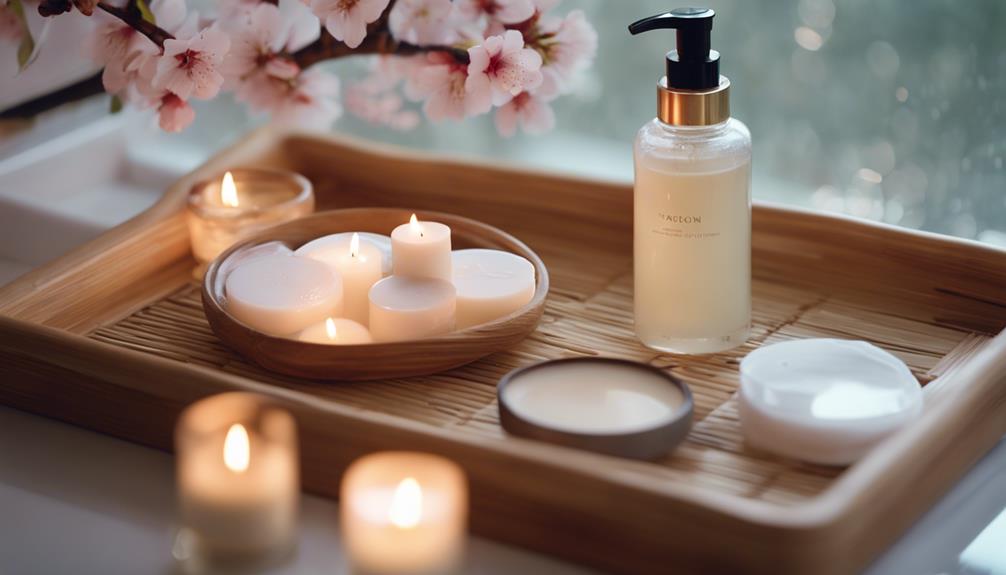If you have sensitive skin, it is important to focus on a gentle routine to prevent irritation. Start by using a mild cleanser to remove impurities without stripping your skin’s natural oils. Apply a hypoallergenic moisturizer with soothing ingredients to damp skin for better absorption. Limit exfoliation to once or twice a week with gentle products. Make sure to stay hydrated by drinking plenty of water, and consider using a humidifier in dry environments. When choosing makeup, opt for sensitive-friendly removers. By following these simple tips, you can create a calming routine that meets the needs of your skin, with more to discover!
Key Takeaways
- Use gentle, fragrance-free cleansers to avoid irritation and maintain your skin's natural barrier.
- Hydrate regularly with hypoallergenic moisturizers containing soothing ingredients like aloe vera and hyaluronic acid.
- Limit exfoliation to 1-2 times per week using mild exfoliants to prevent moisture loss and irritation.
- Apply products in an upward motion on damp skin to enhance absorption and lock in moisture.
Understanding Sensitive Skin
Understanding sensitive skin means recognizing its unique reactions to various stimuli, which often lead to discomfort like redness and itching. Skin sensitivity can be triggered by a wide range of factors, including harsh chemicals in skincare products, environmental changes, and allergens like certain fabrics or fragrances. These irritants can penetrate your compromised skin barrier, particularly in the stratum corneum, exacerbating discomfort and dryness.
It's essential to identify and avoid the specific factors that irritate sensitive skin. What affects one person may not affect another, so pay close attention to your reactions and adapt your routine accordingly. For example, if a new moisturizer causes burning or redness, it may contain an ingredient that doesn't agree with your skin.
Moreover, regular consultations with a dermatologist can provide you with tailored advice and effective treatment options. Understanding your skin's unique triggers and how to avoid them is critical.
Symptoms of Sensitive Skin

If you have sensitive skin, you might notice symptoms like tingling, stinging, or persistent itching when exposed to certain triggers.
Identifying your skin's reactions to different products and environmental factors is key to managing discomfort.
Consulting a professional for an accurate diagnosis can help you customize your skincare routine effectively.
Common Sensitivity Triggers
Sensitive skin frequently reacts to various triggers, resulting in symptoms like redness, itching, and discomfort. You might find that certain skincare products exacerbate these reactions, especially those containing harsh ingredients such as fragrances, preservatives, or alcohol. It's crucial to be mindful of what you apply to your skin, as even gentle formulations can sometimes provoke sensitivity.
Environmental factors also play a significant role. Extreme temperatures, pollution, and UV exposure can leave your skin feeling irritated and reactive. Additionally, allergies to common substances like pollen or pet dander can heighten these symptoms.
Lifestyle choices, including stress, diet, and inadequate sleep, can further impact your skin's sensitivity. When you're stressed or not eating well, your skin may respond more intensely to triggers, making it important to adopt a holistic approach to your skincare routine.
To manage your sensitive skin effectively, consider consulting a dermatologist. They can help you identify specific triggers and recommend tailored skincare products that suit your unique needs, ensuring you find relief from discomfort while maintaining your skin's health.
Identifying Skin Reactions
When your skin reacts with redness, stinging, or persistent itching, it's often a sign of heightened sensitivity to various triggers. Recognizing these symptoms is essential for managing your skin concerns effectively. Your skin is sensitive, and understanding its reactions can help you avoid irritants.
| Symptom | Description |
|---|---|
| Redness | A flushed appearance indicating irritation. |
| Stinging | A prickly sensation often after product use. |
| Burning Sensation | A hot feeling that may accompany redness. |
| Persistent Itching | An ongoing urge to scratch, indicating distress. |
Common triggers include harsh skincare products, allergens, and environmental factors like temperature changes. These reactions may stem from a disrupted skin barrier, leading to increased water loss and greater susceptibility to irritants. You might also notice that symptoms vary with lifestyle factors such as stress, dietary choices, and sleep quality.
Seeking Professional Diagnosis
Recognizing the specific symptoms of sensitive skin is vital for seeking a professional diagnosis to address your unique concerns effectively. You might experience tingling, stinging, discomfort, burning sensations, or persistent itching. These symptoms can vary widely, depending on individual triggers like environmental factors, lifestyle choices, or even genetic predisposition.
To guarantee you receive the best sensitive skin care, consulting a dermatologist is essential. They can conduct tests or assessments to identify underlying conditions or allergens that may be exacerbating your symptoms. A professional diagnosis allows you to pinpoint the exact causes of your sensitivity, leading to more effective treatment options.
Early intervention is key to preventing further irritation and discomfort. With professional guidance, you can establish a tailored skincare routine that meets the specific needs of your sensitive skin. This personalized approach helps promote overall skin health and well-being.
Don't hesitate to reach out to a dermatologist if you notice persistent symptoms; understanding your skin is the first step toward relief and healthier skin.
Sensitive Vs. Irritated Skin

Understanding the difference between sensitive and irritated skin is essential for choosing the right skincare products and routines. Sensitive skin often has a weakened barrier, making it reactive to specific triggers, while irritated skin can react even to normal stimuli due to factors like over-exfoliation or environmental stressors.
Here are some key distinctions to help you identify your skin type:
- Symptoms: Sensitive skin may feel tingling, stinging, or persistent itching, while irritated skin usually shows temporary redness and discomfort.
- Triggers: Sensitive skin reacts to specific ingredients, whereas irritated skin often results from harsh treatments or environmental factors.
- Skin Barrier: Individuals with sensitive skin have a compromised barrier, increasing vulnerability to allergens and irritants.
- Treatment Approach: For sensitive skin, opt for hypoallergenic products and gentle formulations. In contrast, irritated skin can benefit from soothing treatments to restore balance.
Gentle Cleansing Techniques
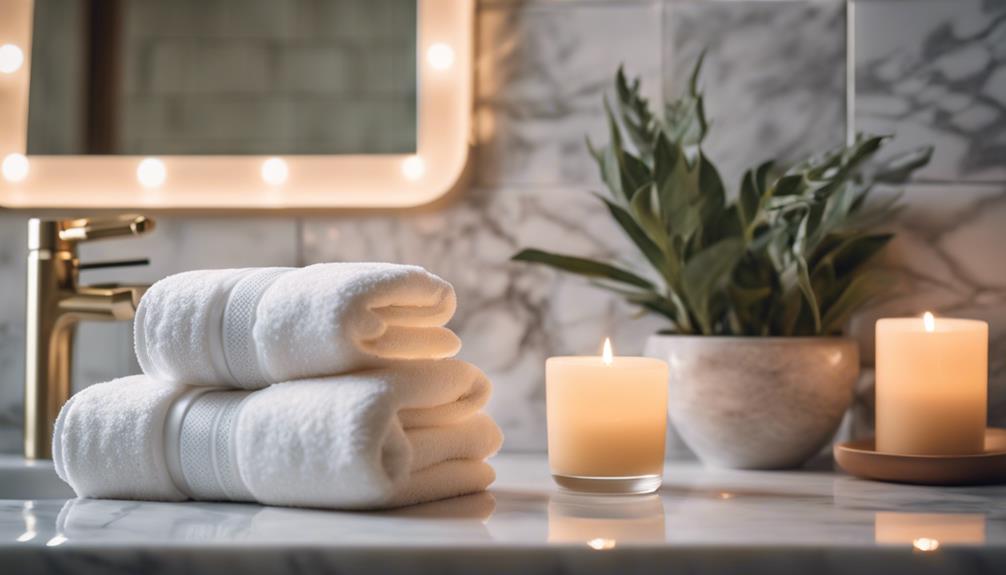
When it comes to cleansing sensitive skin, using the right techniques is key.
You'll want to focus on gentle makeup removal and effective cleansing without causing irritation.
Makeup Removal Essentials
Gentle makeup removal is essential for maintaining the health of sensitive skin, so choose products specifically designed to minimize irritation. Using the right makeup removal essentials guarantees you treat your skin with a gentle touch, avoiding unnecessary redness and discomfort.
Here are four key steps to follow:
- Opt for Sensitive-Skin Products: Use a makeup remover designed for sensitive eyes, focusing on those with anti-inflammatory ingredients like Pro-Vitamin B5.
- Soak and Hold: Soak a cotton pad with your remover and hold it over your eye area for a few moments. This helps dissolve your makeup without the need for rubbing.
- Choose a Gentle Cleanser: Select a gentle cleanser, like Simple® Kind to Skin Moisturizing Facial Wash. Its micellar bubbles lift impurities without harsh scrubbing.
- Rinse and Pat Dry: Rinse your face with warm water after cleansing to avoid aggravating your sensitive skin, then gently pat dry with a soft towel.
Effective Gentle Cleansing
To maintain your sensitive skin's health, choosing the right cleansing techniques is essential for preventing irritation and dryness.
Start with a gentle cleanser specifically formulated for sensitive skin. Look for products with minimal ingredients and free from harsh chemicals to help maintain your skin's natural moisture barrier.
When it's time to cleanse your skin, consider using micellar water or cleansing oils. These options lift impurities without the need for aggressive scrubbing, reducing the risk of irritation. Limit your cleansing routine to once or twice a day, as over-cleansing can exacerbate sensitivity and dryness.
Instead of using abrasive scrubs, incorporate a soft washcloth or cotton pads into your routine. This helps avoid unnecessary friction and protects your delicate skin.
Always rinse with lukewarm water; hot water can strip your skin of its natural oils and lead to further irritation.
Effective Makeup Removal

Effective makeup removal is essential for maintaining healthy skin, especially for those with sensitivities. If you want to avoid irritation and keep your complexion calm, follow these steps:
- Choose the Right Remover: Use a makeup remover specifically designed for sensitive eyes. This minimizes irritation and treats the delicate skin around your eyes gently.
- Soak and Dissolve: Hold a soaked cotton pad over your eye for a few moments. Look for anti-inflammatory ingredients like Pro-Vitamin B5 to enhance comfort while dissolving makeup.
- Gentle Technique: Avoid rubbing or scrubbing. This helps prevent redness and irritation, particularly when dealing with stubborn waterproof mascara.
- Opt for Micellar Water: A gentle cleanser like micellar water lifts impurities without harsh scrubbing. It preserves your skin's natural oils, promoting a healthier complexion.
After cleansing, rinse with warm water to avoid aggravating sensitive skin, and gently pat dry.
Moisturization and Hydration

When it comes to skincare, staying hydrated is key for your skin's health, especially if it's sensitive.
Choosing the right moisturizer and applying it effectively can make all the difference in maintaining your skin's barrier and comfort.
Let's explore how you can enhance your routine with the best techniques and products for ideal hydration.
Importance of Hydration
Hydration plays an essential role in maintaining a healthy skin barrier, preventing irritation and sensitivity in those with delicate skin. When you prioritize hydration, you're reinforcing your skin's natural defenses and ensuring it stays supple and comfortable.
Here are four key ways to enhance your hydration routine:
- Drink Plenty of Water: Aim for around eight glasses a day. This internal hydration directly impacts your skin's appearance and elasticity.
- Use Humectant-Rich Moisturizers: Look for moisturizers infused with fatty acids and soothing ingredients like aloe vera and chamomile. These will help replenish moisture and calm sensitive skin.
- Incorporate Sheet Masks: Treat yourself to sheet masks weekly. They deliver intensive hydration and allow active ingredients to penetrate deeply, boosting your skin's comfort.
- Adjust Your Routine Seasonally: As the weather changes, switch to richer moisturizers to combat dryness and support hydration levels, ensuring your skin barrier remains intact throughout the year.
Choosing the Right Moisturizer
Selecting the right moisturizer is key to maintaining your skin's hydration and comfort, especially for those with sensitive skin.
Start by looking for hypoallergenic products that are free from harsh chemicals, fragrances, and alcohol. These ingredients can cause irritation and allergic reactions, which you want to avoid.
Focus on moisturizers that include soothing ingredients like aloe vera, chamomile, and hyaluronic acid. These components not only hydrate your skin but also help calm any sensitivity.
Rich moisturizers containing fatty acids and ceramides are excellent choices, as they reinforce your skin barrier and lock in moisture, particularly during seasonal changes.
It's also wise to choose non-comedogenic moisturizers to prevent clogged pores, which can lead to breakouts and exacerbate sensitivity.
To maximize the effectiveness of your moisturizer, apply it immediately after cleansing while your skin is still damp. This technique helps seal in moisture and enhances hydration, ensuring your skin stays comfortable throughout the day.
Techniques for Effective Application
Applying moisturizer effectively can greatly enhance its ability to hydrate and protect your sensitive skin. Here are some techniques for effective application that you should incorporate into your routine:
- Moisturize while damp: Apply your moisturizer immediately after cleansing to lock in hydration while your skin is still damp. This maximizes moisture retention.
- Use the right amount: A pea-sized amount of product is sufficient. Too much can overwhelm your skin, while too little won't provide adequate hydration.
- Massage gently: Use upward circular motions to gently massage the moisturizer into your skin. This not only helps with absorption but also stimulates circulation, promoting a healthy glow.
- Layer wisely: For best results, apply a hydrating serum before your moisturizer. This enhances the effectiveness of your moisturizer, providing an intensive hydration boost.
Additionally, consider using a humidifier in dry environments, especially during colder months, to help maintain skin moisture levels.
Exfoliation for Sensitive Skin
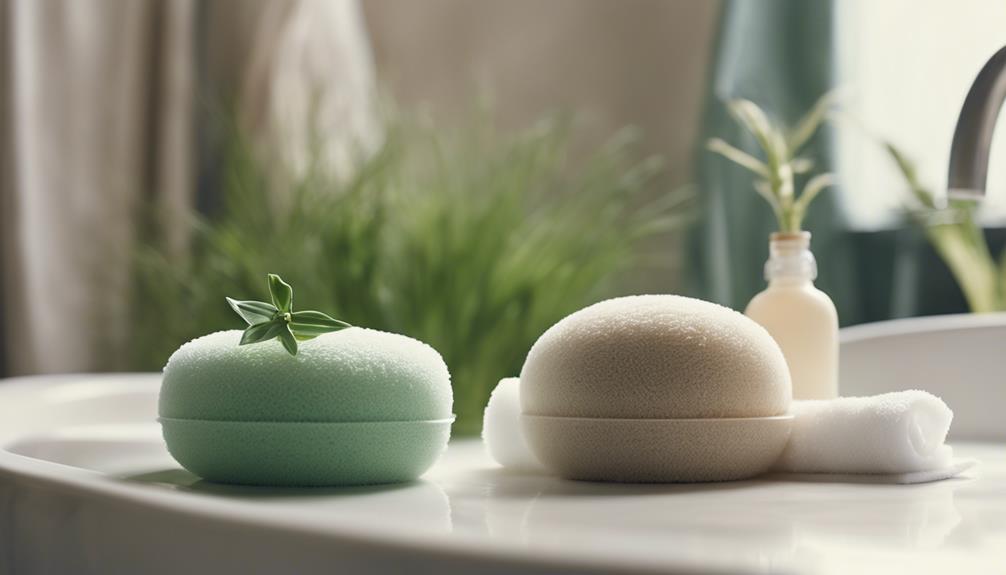
Exfoliating sensitive skin requires a gentle touch and the right products to maintain a healthy complexion without causing irritation. For effective exfoliation for sensitive skin, choose mild exfoliants enriched with soothing ingredients like Pro-Vitamin B5 and Vitamin E. These components help minimize irritation while keeping your skin feeling fresh.
Limit your exfoliation sessions to just 1-2 times per week. Over-exfoliating can strip away essential moisture and compromise your skin barrier, leading to redness and discomfort. When you do exfoliate, apply the product using small circular motions, avoiding excessive pressure to guarantee a comfortable experience.
Before introducing any new exfoliating products, don't forget to patch test them on a small area of your skin. This step is vital in identifying any potential adverse reactions, especially if your skin is particularly sensitive.
Targeting Skin Sensitivities
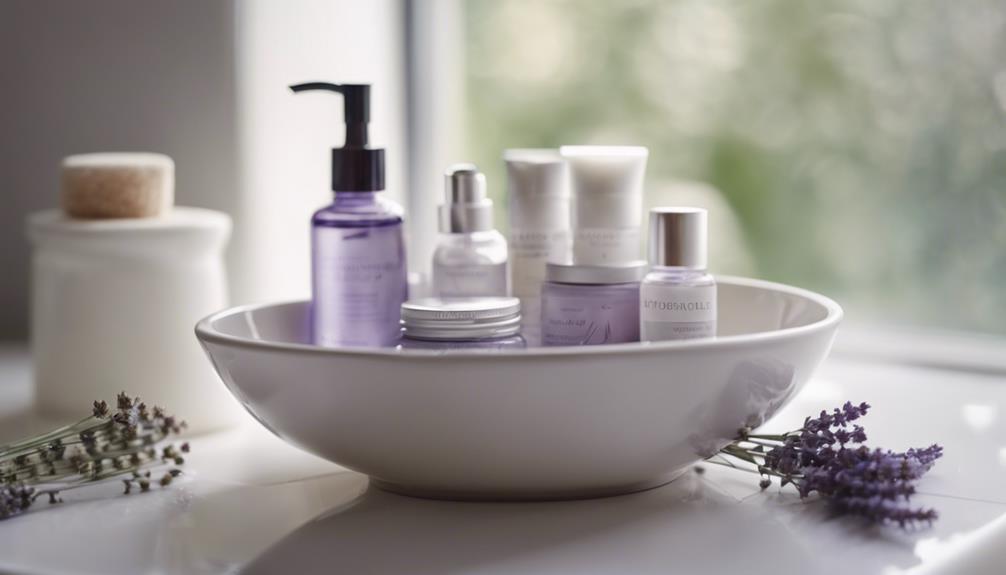
Understanding your skin's sensitivities is key to creating an effective skincare routine that minimizes irritation and promotes comfort. By focusing on the right products and techniques, you can effectively target your skin's specific needs.
Here are four essential tips for sensitive skincare:
- Choose Gentle Cleansers: Opt for sulfate-free, hydrating cleansers that won't strip your skin of its natural oils.
- Incorporate Soothing Ingredients: Look for products containing aloe vera or cucumber, known for their anti-inflammatory properties. They can help calm redness and irritation.
- Hydrate Regularly: Use hydrating ingredients like hyaluronic acid to boost moisture retention and strengthen your skin barrier, which can mitigate sensitivities.
- Patch Test New Products: Always perform a patch test with new products to identify potential irritants before applying them to your entire face.
Nighttime Skincare Routine
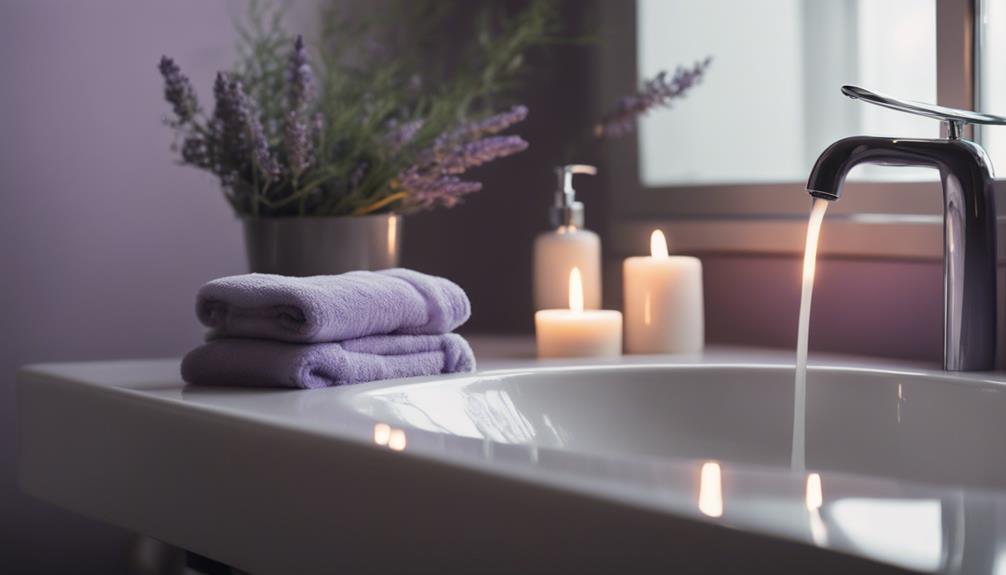
Start your nighttime skincare routine with a gentle, hydrating cleanser that effectively removes impurities without stripping your skin's natural oils. Look for cream or gel formulas that soothe while cleansing.
After cleansing, apply a soothing serum containing hyaluronic acid; this will boost hydration and reduce redness, allowing your skin to repair overnight.
Next, choose a rich moisturizer specifically formulated for sensitive skin. Ideally, it should be non-comedogenic and include calming ingredients like chamomile or aloe vera to lock in moisture. This step is essential, as it creates a protective barrier against environmental stressors.
Incorporate a reparative cream or facial oil at night to enhance hydration, especially focusing on areas prone to dryness. These products can greatly improve your skin's texture while you sleep.
Community Insights and Feedback
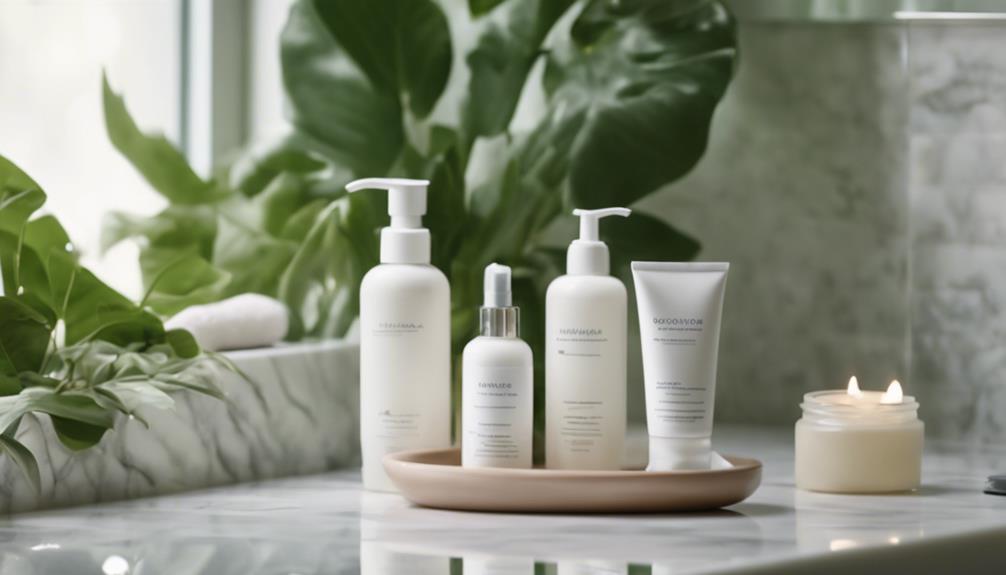
Many people find that sharing their experiences with sensitive skin not only fosters community support but also uncovers valuable insights into effective skincare routines.
You can benefit greatly from engaging with others who understand the challenges of sensitive skincare. Here are some key takeaways from community feedback that can enhance your skincare routine for sensitive skin:
- Gentle Ingredients: Many users swear by the power of natural ingredients, emphasizing their effectiveness for soothing irritated skin.
- Product Recommendations: Discussions often reveal new products that have worked wonders for others, helping you avoid trial and error.
- Identifying Triggers: Sharing personal stories about specific triggers can help you pinpoint what to avoid in your own routine.
- Supportive Environment: Connecting with others fosters a sense of belonging, making it easier to navigate the ups and downs of sensitive skin.
Can ROC Skincare Products Be Used for Sensitive Skin?
Yes, ROC skincare products can be used for sensitive skin. When choosing products, look for gentle formulas with calming ingredients like aloe vera and chamomile. Patch test new products and start slow. Following effective skincare routine tips will help keep sensitive skin calm and healthy.
Conclusion
Incorporating gentle care into your skincare routine is like wrapping your skin in a soft, comforting blanket.
By understanding your sensitivities and choosing the right products, you can nurture your skin back to health.
Remember to cleanse, exfoliate, and hydrate thoughtfully, and always listen to your skin's needs.
With patience and consistency, you'll find a routine that helps you glow confidently, embracing the beauty of sensitive skin without the fear of irritation.
